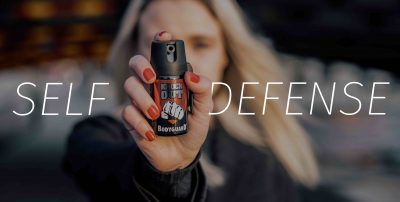For women, walking across campus after a late night in the library or at a club meeting can be a treacherous journey. The unfortunate truth is that women will always face a risk.
Outside of college, women can take comfort in knowing there are safety measures to prevent uncomfortable or dangerous situations: self-defense tactics, carrying your keys between your knuckles and buying tasers, mace or pepper spray.
But, Boston University — a public campus intertwined with the city and readily open to whomever passes you on Commonwealth Avenue — bans the use of pepper spray and mace.

Even if a student is licensed by the Commonwealth to carry pepper spray, BU still prohibits its possession on campus. Students who violate this policy face disciplinary action. Tufts University, Northeastern University and the Massachusetts Institute of Technology all share this policy.
The BU Handbook also prohibits firearms, which at least makes sense. Massachusetts state law also bans firearms for civilian use on every other college campus.
However, the state does not appear to have a law against pepper spray.
The same law prohibiting firearms on campus states: “Whoever, not being a law enforcement officer … carries on the person a firearm, loaded or unloaded, or other dangerous weapon in … college or university … shall be punished by a fine of not more than $1,000 or by imprisonment for not more than 2 years or both.”
Earlier in the section, the state defines a near-exhaustive list of dangerous weapons with no mention of pepper spray — including switch knives, nunchucks and metallic knuckles.
Furthermore, Harvard University’s student handbook has no mention of pepper spray. In fact, the University’s Summer School Handbook explicitly states: “Harvard Summer School students may lawfully possess and use pepper spray for self-defense.”
There should be no reason to punish the possession of a self-defense spray. For one, these sprays pose little to no risk.
Medically, pepper spray is classified as fairly safe. The effects of pepper spray are non-lethal and typically short-term, including symptoms such as coughing, eye pain, chest pain and rashes. In very rare cases, pepper spray can lead to other complications.
Plus, pepper spray is only legal if used for self-defense and in cases of immediate danger. It could not be used as a weapon of unprovoked attack.
Given that it is up to individual colleges to create and uphold these policies, it is short-sighted and naive not to permit such a crucial self-defense weapon when students can live in Danielsen Hall or in Allston, both of which are far from central campus. It is also outrageous our own school holds such disregard for our safety.
People who are often targeted by physical and sexual violence need pepper spray, because it is not enough to clutch their keys tightly between white knuckles as they walk home alone.
The University already has a high sexual assault rate — 23 percent of undergraduate women who responded to the 2019 BU Campus Climate Survey of Sexual Assault and Misconduct indicated they experienced some form of sexual assault.
Though slightly lower than the average for other schools in the Association of American Universities, we should still be outraged with any percentage above zero. The survey also only got a response rate of 13.4 percent, which is a limited pool of respondents. In addition, it’s possible some of the respondents were not as forthcoming about their experiences.
Of course, much of the campus culture and response to sexual assault lies in its education, administration, policies and preventative measures. Many students have stated their sexual assault claims have been dismissed or mishandled by the administration.
The Instagram page @campus.survivors has an overwhelming number of BU submissions, many of which detail how the University worsened their experience or did not even believe their claims.
The stories that have come to light also emphasize the pervasive sexual harassment culture among the University’s fraterneties. Yet, the administration continues to turn a blind eye, letting students get away with sexual assault. It is disappointing, but not surprising, considering the school’s history of covering up cases.
Furthermore, the preventative services BU offers aren’t exactly comprehensive, effective or well known.
In response to the pandemic, the University’s one escort service, Scarlet Safewalk, has been rebranded to focus more on COVID-19. The escort services, though still available, changed their operating hours from 10 p.m. to 2 a.m. to 9 p.m. to midnight. This development is less than satisfactory, especially since the original program was already limited by its 2 a.m. cutoff.
Students’ main alternative is to use the blue-light phone boxes across campus. However, that resource is reserved for contacting the BU Police Department in the event of an emergency or immediate assistance. It’s not really geared toward simply providing a safe walk home.
If the University does not allow students to protect themselves and does not hold perpetrators of sexual assault accountable, it is effectively enabling and perpetuating the cycle of assault. Though the pepper spray may be small in size, the right to carry it at Harvard demonstrates it is possible to give students tools to protect themselves.
To make an effort against sexual assault and harassment, BU must implement better services, improve its sexual assault hearing process, hold sexual assaultors accountable and, at the very least, lift the ban on pepper sprays.




















































































































John Sand • Dec 4, 2020 at 4:18 pm
BUPD illegally denied the woman sexually assaulted by Kevin Rivlin (formerly of Questrom, now of Chicago) information related to her case, because she wasn’t a current student. The university doesn’t care about women’s safety on campus.